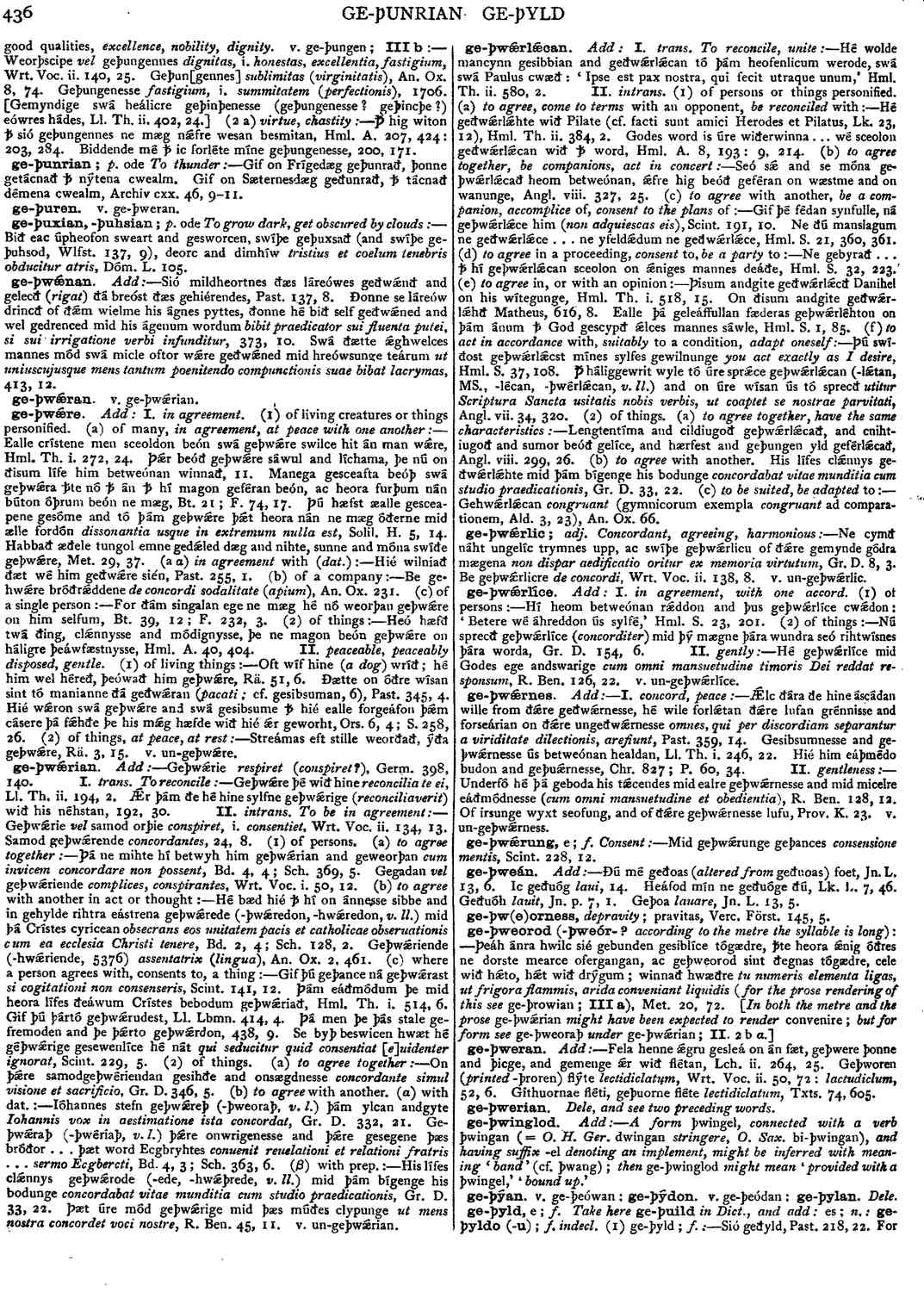ge-þwǽrlǽcan
- verb
- Hé wolde mancynn gesibbian and geðwǽrlǽcan tó þám heofenlicum werode, swá swá Paulus cwæð: 'Ipse est pax nostra, qui fecit utraque unum,' Hml. Th. ii. 580, 2.
-
Hé geðwǽrlǽhte wið Pilate (cf. facti sunt amici Herodes et Pilatus,
- Lk. 23, 12), Hml. Th. ii. 384, 2.
-
Godes word is úre wiðerwinna ... wé sceolon geðwǽrlǽcan wið ꝥ word,
- Hml. A. 8, 193: 9, 214.
-
Seó sǽ and se móna geþwǽrlǽcað heom betweónan, ǽfre hig beóð geféran on wæstme and on wanunge,
- Angl. viii. 327, 25.
-
Gif þé fédan synfulle, ná geþwǽrlǽce him (
non adquiescas eis
),- Scint. 191, 10.
-
Ne ðú manslagum ne geðwǽrlǽce ... ne yfeldǽdum ne geðwǽrlǽce,
- Hml. S. 21, 360, 361.
-
Ne gebyrað ... ꝥ hí geþwǽlǽcan sceolon on ǽniges mannes deáðe,
- Hml. S. 32, 223.
-
Þisum andgite geðwǽrlǽcd Danihel on his wítegunge,
- Hml. Th. i. 518, 15.
-
On ðisum andgite geðwǽrlǽhð Matheus,
- 616, 8.
-
Ealle þá geleáffullan fæderas geþwǽrléhton on þám ánum ꝥ God gescypð ǽlces mannes sáwle,
- Hml. S. i. 85.
-
Þú swíðost geþwǽrlǽcst mínes sylfes gewilnunge
you act exactly as I desire,
- Hml. S. 37, 108.
-
Ꝥ háliggewrit wyle tó úre sprǽce geþwǽrlǽcan (-lǽtan, MS., -lécan, -þwérlǽcan, v. ll.) and on úre wísan ús tó sprecð
utitur Scriptura Sancta usitatis nobis verbis, ut coaptet se nostrae parvitati,
- Angl. vii. 34, 320.
-
Lengtentíma and cildiugoð geþwǽrlǽcað, and cnihtiugoð and sumor beoð gelíce, and hærfest and geþungen yld geférlǽcað,
- Angl. viii. 299, 26.
-
His lífes clǽnnys geðwǽrlǽhte mid þám bígenge his bodunge
concordabat vitae munditia cum studio praedicationis,
- Gr. D. 33, 22.
-
Gehwǽrlǽcan congruant (gymnicorum exempla
congruant
ad comparationem,- Ald. 3, 23), An. Ox. 66.
Bosworth, Joseph. “ge-þwǽrlǽcan.” In An Anglo-Saxon Dictionary Online, edited by Thomas Northcote Toller, Christ Sean, and Ondřej Tichy. Prague: Faculty of Arts, Charles University, 2014. https://bosworthtoller.com/50177.
Checked: 0